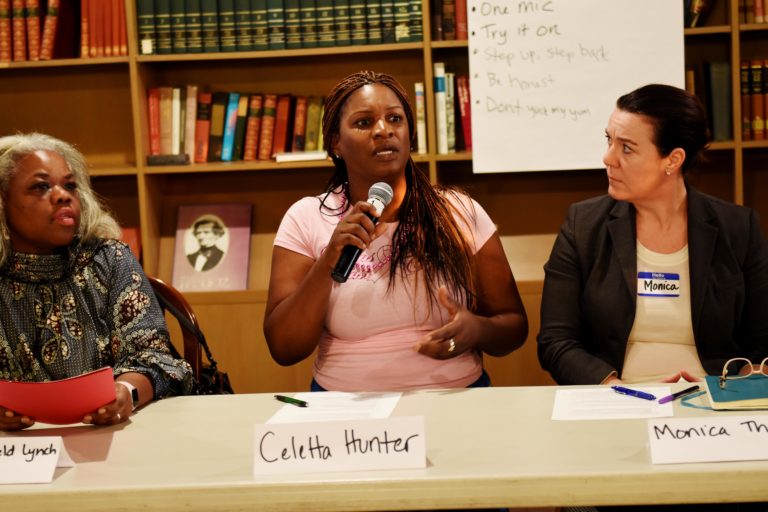Debate Brewing Over Closing Public Schools in Oakland
Oct 29, 2017

Among the speakers at the discussion/debate on school closures, held at Holy Names University, were (L to R) Dr. Kimberly Mayfield Lynch (moderator), Celetta Hunter and Monica Thomas. Photo by Ken Epstein
By Ken Epstein
The Oakland Unified School District (OUSD) is once again considering closing schools, which is sometimes described directly as “rightsizing” the district or indirectly as part of reform plans to “reconfigure” or “redesign” the district’s “portfolio” of school sites.
While no schools have been slated so far for closure and no decisions have been made, OUSD has formed a Blueprint for Quality Schools – with a 55-member community advisory group. According to the district website, “The Blueprint for Quality Schools is a plan with long lasting impact to meet the changing facility, program and educational needs of the district.”
The advisory group is supposed to submit a report to the board at the beginning of next year.
OUSD has been under pressure to close schools since 2003 when it went bankrupt and was taken over by the state. State Trustee Randy Ward closed 14 schools, and five were closed under the administration of former Superintendent Tony Smith.
At the time of the state takeover, the rationale was based on state guidelines for an acceptable ratio of square footage of public school space and numbers of students, according to state-imposed managers of the Fiscal Crisis Management and Assistance Team (FCMAT).
At present, Oakland has 86 district schools and 44 charter schools. In addition, a number charter schools are submitting applications to open next year.
During the current budget crisis, the school board invited FCMAT to look at the district’s financial condition and make recommendations for improvement.
Among other suggestions, FCMAT advised closing schools, telling the board it would be “amazed” by how much money the district would save.
Within a context of deep concern for the future of Oakland schools, parents and members of the education community held a debate/discussion about the potential of closing schools, Tuesday evening at Holy Names University, sponsored jointly by the Board of Education Member Shanthi Gonzales and the Education Department at Holy Names.
Questions included whether school closings saved money or were ever academically justifiable, how to reduce the negative impacts of closing schools and whether school closings connected to redesign or reconfiguration of OUSD could lead to higher quality schools.
The five panel speakers included Dr. Kitty Kelly Epstein, a professor at Holy Names, also opposed schools.
“A national study found that there are no benefits to school closure,” she said. “It not only does not benefit students academically, it doesn’t save money.”
Closure costs more than it save because of the expenses of moving people and equipment to new schools, maintaining closed buildings and remodeling buildings where students are moved, as well as the lost income when students leave the district, she said.
In districts across the country, closure disproportionately impact Black students and teachers, she said.
Monica Thomas, a former OUSD principal and currently a district network superintendent, talked about the redesign of a school that led to higher quality program and was not disruptive to parents and students.
She was involved in 2005 in the redesign of Whittier Elementary School, which became Greeenleaf.
The reconfiguration was “totally community led … steeped in what the parents, teachers and students wanted. It took an entire year,” said Thomas.
Kristin Zimmerman, a parent and member of the Blueprint for Change Advisory group, said that school redesign must make spaces for all of our children. “It is not just facilities, it’s about what’s best for our students.”
“We have ae to push vision and values to the center. If we don’t do it that way, we’re using a wrecking ball.
She said she was a parent at Tilden School, “which was great and then it closed” in 2010.
“Tilden was actually a model for other schools,” she said. “We erased what we had with the expediency of trying to save money.”
Cintya Molina, a parent who works in the OUSD community engagement department, says any changes in the district should not be rushed.
“There needs to be time for the process to unfold,” she said.
She was also concerned about the impact of lack of stability on “children who get moved a lot.”
“People do not know what it’s like not to have friends, not be rooted. They don’t know what it feels like,” she said.
Panelist Celetta Hunter, a teacher and alum of Castlemont High School, opposed closing schools.
“We get reconfigured and reconfigured. What we have are the same things over and over again” she said.
“Those are things we need to look at when you talk about reconfiguration and closure: what is it going to do to that community?”
“This may be beneficial for a small percentage of African American families, but there is a large percentage that will not benefit. And they get lost,” said Hunter.